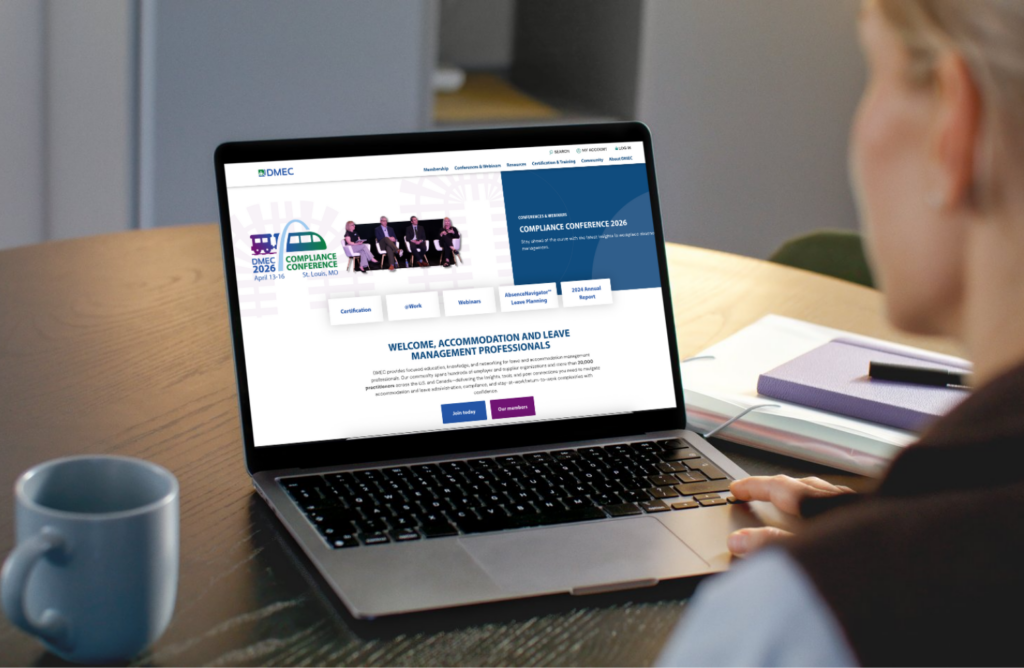
During the 2025 DMEC Annual Conference, I heard a recurring theme: Employers are embracing a holistic approach to leave and accommodation management — a promising shift that signals real progress. The more we design benefit plans and policies with a broad brush to help employees stay at work and return, the better.
According to the 2024 DMEC Absence Plan Design and Practices Benchmarking Report, employers are actively redesigning programs to be more supportive, inclusive, and accessible — another encouraging trend with far-reaching implications, which is important on several levels. It is easy to get mired in requirements for hundreds of U.S. leave laws and make assumptions about the treatment of employees with disabilities. Yet that can be dangerous, as mistakes are costly.
To make sure your leave management programs align with your intent and organizational culture, ask how your teams define, identify, and accommodate disabilities. Find out if employees understand their rights, and evaluate whether your plans and policies support employees of all ages, interests, and abilities. I say this frequently and it bears repeating: What you don’t know can hurt you. The most strategic approach is to investigate (instead of making assumptions) and invest time and energy in the kind of education and training that prepares your teams for success.
Overcoming Hurdles
The truth is that there is a large chasm between theory and practice. It’s illustrated annually during the DMEC Regional Compliance Webinar series in October when legal experts highlight the cost of noncompliance, which frequently stems from a lack of knowledge and understanding. There is shock value to some cases, which seem deceptively simple, and reinforce the importance of ongoing training to educate managers about entitlements and ensure a consistent approach.
These compliance challenges underscore the importance of foundational legislation like the Americans with Disabilities Act (ADA), which continues to shape how we support employees in the workplace.
This year marked the 32nd anniversary of the ADA, which we discussed with members on DMECommunities, DMEC’s online discussion platform. It’s important to revisit the ADA and how it has influenced leave management. It is equally important to emphasize why the Americans with Disabilities Amendments Act (ADAAA) was needed 16 years later to clarify the law’s purview, protect more employees, and prevent a narrow interpretation of eligibility.
While more employers understand they have a responsibility to help employees stay at work and return when a leave of absence is needed, there is room for improvement.
Supporting employees with disabilities, especially those with invisible conditions, requires empathy and a bias-free mindset. While it’s natural for seasoned professionals to be wary after having difficult (and oftentimes emotional) experiences, we must not let a few bad actors overshadow our commitment to fairness and support. Open conversations about these issues, which can otherwise fester, can provide helpful perspectives and coping mechanisms.
Turning Over a New Leaf
Gathering with like-minded professionals is an effective way to accomplish this and to recalibrate and inspire teams. It is energizing to hear employers discuss unique approaches to age-old challenges and share benefits designed to alleviate stress, such as compassionate leave programs and caregiving concierge benefits for employees stretched thin on all fronts.
During the 2025 DMEC Annual Conference professionals also discussed the need for transparency in leave management circles, and the value of being vulnerable when discussing all types of employee benefits, including accommodations, to encourage more employees to seek help.
In fact, employers that take the time to consider all facets of an employee’s life when designing plans and policies emerge as winners in this equation. The fact that more employers are discussing holistic approaches to this work is not just promising, it is essential as we work with an increasingly diverse employee population.
The key is to keep the conversations we began during the 2025 DMEC Annual Conference going. We heard from technology disruptors and innovators on all levels, and those conversations are just the beginning. Join us on on Oct. 1 for our virtual event; an essential gathering for anyone committed to advancing inclusive, effective leave and accommodation management.











